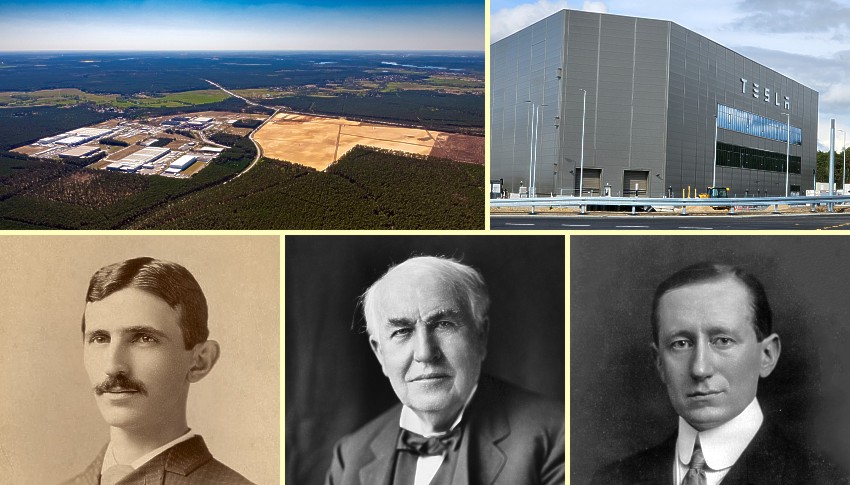Kansas Snapshots by Gloria Freeland - May 12, 2023
Tesla's magic
When we have visited the Berlin area, our German friend Matthias has long offered us the use of a small holiday bungalow near a
wooded lake far from the hubbub of the city. A couple of miles to the north is the A-12, the autobahn that connects Berlin with
Poland about 25 miles to the east. But when time is not a priority on our trips to the German capital, husband Art and I opt for
a small country road a few miles farther north. Fewer vehicles, lower speeds and miles of trees make it a relaxing drive.
But Elon Musk is changing that. Where that quiet country road connects to Berlin's high-speed ring autobahn, Musk's company is
building one of its Gigafactories. In the summer of 2019, there was no trace of it. Today, it has more than 8,000 workers and
continues to hire more. This past March, nearly 5,000 electric vehicles were produced at the plant and the goal is 10 times that
number per month. Occupying more than a square mile, the site is, to say the least, impressive.
But why is the company's name Tesla? In the late 1800s, Croation-born Nikola Tesla's ideas were threatening the electric power
distribution system manufactured by our national hero Thomas Edison. Modern power companies with names such as Consolidated Edison,
Commonwealth Edison, and Southern California Edison, make it clear that the man called the wizard of Menlo Park, the place in New
Jersey where Edison had his laboratory, was the winner.
Or was he?
Edison's method of developing an invention might be compared to the way a cook develops a new recipe by doing this and that until
the result is satisfactory. This repeated refining of earlier efforts requires many men laboring over the details. To pay their
wages and the cost of materials used in intervening attempts, Edison needed money. A competing power system would pose a threat to
his business model.
Ironically, Tesla became a threat by securing a job working for the Edison company in France. His abilities were recognized by his
Paris boss, leading Tesla to move to the Edison works in the United States.
Unlike Edison, Tesla did most of the work in his head. His inventions appeared to go directly from conception to fruition, almost
like magic. To those who knew them both, certainly the word wizard seemed a better fit for Tesla than for Edison. But Edison
understood the value of public opinion where commerce was concerned. Historians largely agree that Edison's inventions were
primarily the result of the time being right. If there had been no Edison, others would have developed the light bulb, the
phonograph and motion pictures. But the perception of Edison as a genius, which he spared no effort in fostering, would convert
into sales of his products.
In contrast, Tesla was more of a scientist than a businessman and his insights were revolutionary rather than evolutionary.
Daughter Katie once told Art she just didn't understand electricity as it seemed like magic. Tesla's most important ideas involved
rapidly-changing electricity - magic at high speed. But like any good businessman, Edison came to understand Tesla's ideas were
superior and soon adopted Tesla's as his own.
We humans are fond of a good story and an essential ingredient in such a tale is conflict. But one based on business finances and
hard-to-comprehend concepts such as how "magic" is delivered to our homes are more confounding than captivating. So writers
relating the Edison-Tesla competition frequently opt for a bit of poetic license. They encourage the notion that Edison and Tesla
nurtured a personal hatred for each other, despite there being scant evidence and the fact each publicly praised the other.
This modern version of the story also involves tearing down the popular view of Edison as a man who labors long and hard and is
finally rewarded for his efforts. Tesla is cast as the true, but tragic, hero. His ideas win out, but dies penniless and alone at
the age of 86 in a New York hotel room, while Edison is remembered as a national treasure.
Oddly, a somewhat-parallel tale played out between Tesla and Marconi, the man widely thought of as the inventor of radio. Like
Edison, Marconi received much attention for his work in radio. Yet the Supreme Court effectively nullified his patents. The website
HowStuffWorks put it succinctly:
... the U.S. Supreme Court upheld patent 645,576, thus restoring Tesla ... as the inventor of the radio. Nevertheless, many
people still tend to think of Marconi as the father of the radio.
So the ideas behind cell phones, televisions, GPS systems, the national power grid and even the motors in Musk's cars can all be
traced back to Tesla's work. In 1960, people in the scientific community recognized Tesla's contributions by naming a fundamental
physical unit for him. And now we have a major corporation with his name. He is now receiving public recognition, even if the story
has been a bit shaded to draw attention.
In regard to our favorite route to Berlin, I have mixed feelings when I pass the Tesla plant on Berlin's southeast edge. Many pine
trees were cut, but a wider range of species has replaced some of them, a diversity locals agree was badly needed. The area had
not been usable by people because of unexploded ordinance remaining from World War II. That too has been addressed. And the vehicles
produced will, over the long term, reduce the pollution generated by our on-the-go lifestyle.
So, in balance, I believe it is a good thing. And the loss of a bit of our peaceful path connecting us to friends or events is a
small price to pay in return for a bit of Tesla's magic.
